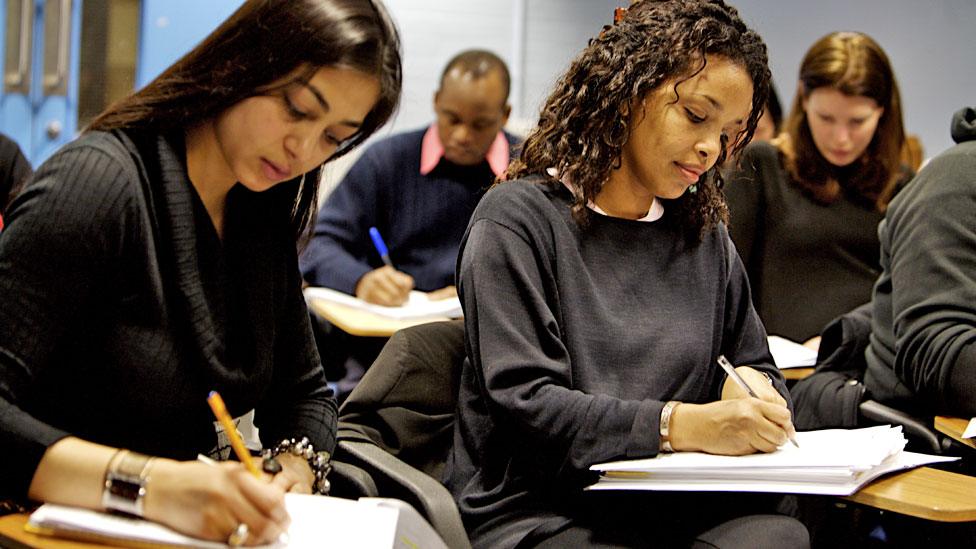University unconditional offers 'undermine education'
- Published
Emile and Lleucu both have unconditional offers but said they still worked hard
The education system is being undermined by universities making more unconditional offers, according to the head of Wales' biggest college.
David Jones, of Coleg Cambria, said offers were coming half way through courses and meant many A-level students were taking their "foot off the pedal".
Figures from admissions service Ucas show a big rise in the number of unconditional offers for 18-year-olds.
Universities Wales said they were still "a small percentage" of the total.
Unconditional offers guarantee a university place to students, whichever grades they get in their A-level exams.
Ucas said the total number of these type of offers made to 18-year-olds from England, Northern Ireland, and Wales had risen by 65,930 over the past five years - from 2,985 in 2013 to 67,915 in 2018.
This means nearly a quarter (23%) of applicants received an unconditional offer this year.
Why might students get an unconditional offer?
Outstanding students who the university wants to tempt to commit to studying.
Mature students who already have their qualifications.
Creative arts subjects where a portfolio is submitted.
But there has been concern that the growth of unconditional offers in recent years is driven by the pressure for universities to secure student places in a highly competitive market.
Mr Jones, chief executive of Coleg Cambria, which has 27,000 students in Wrexham, Flintshire and Denbighshire, said some of what resulted from this intense competition was "bordering on immoral".
Mr Jones said it could also lead to less effort by students "once they had got the ticket to get them where they want to go in advance".
"It totally undermines the education system because it's about demonstrating with evidence - and exams are one example of it - that you have skills and knowledge. If you continue to undermine that system, we will be on a very slippery slope, where education levels across the UK will reduce even further."
He said he was also finding more universities were offering very low entry grades for students who have not done very well.

How many unconditional offers are made by Welsh universities?
In a freedom of information request, BBC Wales asked individual universities about the number of unconditional offers they have made for all undergraduates of all ages:
The University of Wales Trinity St David said unconditional offers made to students through Ucas for full-time undergraduate courses accounted for 26% of the total offers made. It said the figure for all its courses was 53.4%.
Cardiff University said it made 6,504 unconditional offers - 26% of the total offers for that year.
It said it only gave unconditional offers to students who had already received their exam results, and that they were not given where results were still unknown.
Cardiff Metropolitan University said the 21% of unconditional offers it made in 2017 were partly due to the implementation of unconditional offer schemes in the school of art and design and education.
Bangor University said 6.4% of its offers in 2017-18 were unconditional, Swansea University's figure was 10%, while Aberystwyth said the 9.3% of unconditional offers it made included offers to those who had passed the scholarship exam.
Wrexham Glyndwr University said 20% of its 2017-18 offers were unconditional and the University of South Wales did not provide figures, saying it operated in a "competitive environment" and wished to protect information it considered to be "sensitive".

Universities Wales - which represents higher education institutions - said unconditional offers represented 5.3% of all offers made to 18-year olds.
It said it was important to remember that students came from a diverse range of backgrounds with a variety of qualifications.
"As such, Welsh universities use a whole range of factors and contextual data when considering whether to offer a place to ensure that everyone with the determination, skills and desire to access higher education should be able to do so," said a spokeswoman.
- Published26 July 2018

- Published19 June 2018
